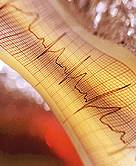
TUESDAY, May 21 (HealthDay News) — Use of the antidepressant Lexapro appears to help prevent a potentially serious stress-related heart condition, a new study finds.
The condition is known as known as “mental stress-induced myocardial ischemia.” Although people with this condition may not develop noticeable symptoms, their heart muscle is not receiving adequate blood supply, according to researchers from Duke University School of Medicine in Durham, N.C.
However, the researchers found that people taking the antidepressant Lexapro (escitalopram) were more than two and a half times less likely to be affected by the condition, which can be spurred by emotional stress.
The study was funded by the U.S. National Heart, Lung, and Blood Institute and is published in the May 22 issue of the Journal of the American Medical Association.
“Mental stress-induced myocardial ischemia is a serious condition, as patients with the condition tend to have worse heart problems compared to patients without it,” study author Dr. Wei Jiang, an associate professor of psychiatry and behavioral sciences and internal medicine at Duke, said in a university news release. “This study showed for the first time that it is treatable with an emotion-modulating medication.”
The study involved 310 people diagnosed with heart disease whose condition was stable and under control. To identify those with the stress-linked heart condition, the researchers first had participants undergo exercise stress tests on a treadmill. They also had to complete three mental stress tests: First they had to solve a difficult math problem, then trace a star while looking at their hand movements in a mirror, and then tell a story that made them feel sad or angry.
As the participants performed these tasks, they underwent echocardiograms and electrocardiograms, and had readings taken of blood pressure and heart rate.
According to Jiang’s team, 127 of the patients developed stress-related heart issues. These patients were assigned to take either Lexapro, a selective serotonin reuptake inhibitor (SSRI) that’s commonly used to treat depression and anxiety, or a placebo pill.
After six weeks, the participants retook the stress tests and had their heart function re-assessed. Of the original 127, 112 completed the study. The researchers found those who took the antidepressant drug were nearly three times less likely to develop stress-linked cardiovascular trouble during the mental stress tests compared to those taking placebo.
Patients taking Lexapro also tended to have healthy changes in heart function and they reported feeling calmer and more controlled than the placebo group.
“Our findings support the hypothesis that short-term use of SSRIs improves levels of biomarkers associated with adverse cardiovascular outcomes,” explained Jiang. Other SSRIs include Celexa, Paxil, Prozac and Zoloft.
The researchers concluded that SSRIs or other antidepressant treatments could help manage heart disease. They noted that more research is needed to determine the proper dosing of Lexapro for the treatment of stress-linked heart issues and to better understand how antidepressant drugs could also affect patients’ risk for serious health conditions, including heart attack or angina, stroke, heart failure, or death.
Two experts said the study findings weren’t surprising, given emotional stress’ known role in cardiovascular woes.
“We have known that heart disease symptoms can occur from more than just physical stress like exercise, but also emotional stress as well,” said Dr. Lawrence Phillips, an assistant professor of medicine in the division of cardiology at NYU Langone Medical Center, New York City. “This study demonstrates that medication therapy to reduce emotional stress can decrease the risk of heart damage.”
In fact, “when speaking to patients about a symptom of chest pain, physicians will typically ask them if the chest pain is brought on by exercise or by emotional stress,” Phillips added. “Many of the interventions we work on address the physical stress portion. This study reminds us of the importance of treating the emotional stress and treating the patient as a whole.”
Dr. Suzanne Steinbaum is a preventive cardiologist at Lenox Hill Hospital in New York City. She agreed that emotional stressors are a piece of the puzzle in treating heart patients.
“With this data, it is important to evaluate patients for anxiety, depression and mental stress as part of the heart health paradigm, as not treating these psychological markers may worsen their disease,” she said.
More information
The U.S. National Institute of Mental Health provides more information on the link between depression and heart disease.

